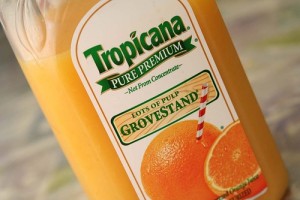
Did you know that the Florida orange juice “not from concentrate” most likely comes from Brazil? Or how about the fact that the orange juice you may think of as “fresh” may have sat in a storage tank for more than a year? Alissa Hamilton wrote a book called “Squeezed: What You Don’t Know About Orange Juice” in which she reveals the secrets of the orange juice industry.
The following is from an interview with her published in the Boston Globe:
IDEAS: What isn’t straightforward about orange juice?
HAMILTON: It’s a heavily processed product. It’s heavily engineered as well. In the process of pasteurizing, juice is heated and stripped of oxygen, a process called deaeration, so it doesn’t oxidize. Then it’s put in huge storage tanks where it can be kept for upwards of a year. It gets stripped of flavor-providing chemicals, which are volatile. When it’s ready for packaging, companies such as Tropicana hire flavor companies such as Firmenich to engineer flavor packs to make it taste fresh. People think not-from-concentrate is a fresher product, but it also sits in storage for quite a long time.
IDEAS: What goes into these flavor packs?
HAMILTON: They’re technically made from orange-derived substances, essence and oils. Flavor companies break down the essence and oils into individual chemicals and recombine them. I spoke to many people in the industry at Firmenich, different flavorists, and at Tropicana, and what you’re getting looks nothing like the original substance. To call it natural at this point is a real stretch.
IDEAS: [W]hat is the phrase “not from concentrate” really about?
HAMILTON: In the ’80s, Tropicana had a hold on ready-to-serve orange juice with full-strength juice. Then this new product, reconstituted orange juice, started appearing in supermarkets. Tropicana had to make decisions. Storing concentrate is much cheaper than full-strength juice. The phrase “not from concentrate” was to try to make consumers pay more for the product because it’s a more expensive product to manufacture. It didn’t have to do with the product being fresher; the product didn’t change, the name simply changed. Tropicana didn’t want to have to switch to concentrate technology.
IDEAS: To what degree is orange juice still made from Florida oranges?
HAMILTON: Most concentrate is now from Brazil. Shipping it is relatively easy. Until recently, you could count on [Tropicana] Pure Premium being from Florida, but shipping technology has advanced. Companies like Tropicana have started shipping full-strength juice from Brazil rather than buying and squeezing in Florida. The majority of not-from-concentrate is coming from Florida-squeezed oranges, but that’s certainly changing. The orange growing is moving to Brazil, which grows the most oranges for juice by far. Land is cheaper, and environmental regulations are almost nonexistent.
IDEAS: How is this affecting Florida growers?
HAMILTON: They are really struggling because of the growth of the industry. This product designed to help them has now effectively made them redundant. The groves are disappearing. They’re being turned over in favor of condominiums. That was my ultimate aim, to show the connection between how processing does affect growing and how we as buyers – our lack of knowledge – does have implications for agriculture.
Interesting stuff, isn’t it? I certainly always knew that store bought orange juice was not really real orange juice but I never even imagined the chemistry that goes into it. I feel a little naive admitting this since I should have known that all processed food is, well… heavily processed. Yet, my only excuse is that orange juice was most often in a glass on my table and not on my mind. And how about realizing that I, as an anonymous buyer actually am part of a force that is contributing to the disappearance of orange groves in Florida?
I am grateful for this article and for this new-found knowledge. After all, knowledge is power. I am not a dietitian but I feel seriously disturbed by the brief facts stated above and just simple reasoning tells me that this chemical concoction called “orange juice” cannot be good for me. Also, I very much care about preserving the Amazon forest and taking good care of nature. So here is where I stand from now on: I am done with fake orange juice!
You can read the full article here.